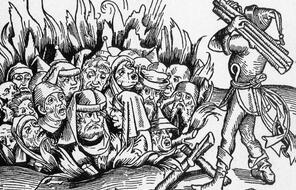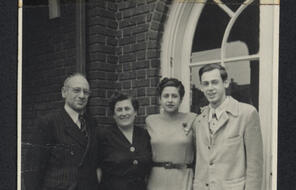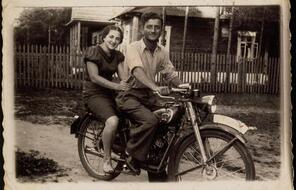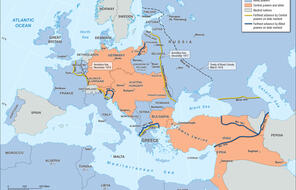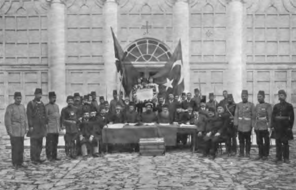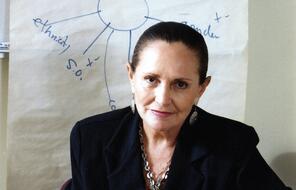Finding One's Voice
At a Glance
Subject
- Civics & Citizenship
- History
- Social Studies
- Human & Civil Rights
- The Holocaust
How much of our identities can we define for ourselves, and how much is determined by other influences, such as our families, our culture, and the circumstances of our lives? Writer Julius Lester defied other people’s expectations on his journey toward understanding and defining his identity. Here, he reflects on the way violence and humiliation affected his childhood:
I grew up in the forties and fifties in Kansas City, Kansas, and Nashville, Tennessee, with summers spent in Arkansas. The forties and fifties were not pleasant times for blacks and I am offended by white people who get nostalgic for the fifties. I have no nostalgia for segregation, for the “No Colored Allowed” signs covering the landscape like litter on the smooth, green grass of a park, I have no nostalgia for a time when I endangered my life if, while downtown shopping with my parents, I raised my eyes and accidentally met the eyes of a white woman. Black men and boys were lynched for this during my childhood and adolescence. 1
Lester describes the way he survived those years as follows:
I grew up in a violent world. Segregation was a deathly spiritual violence, not only in its many restrictions on where we could live, eat, go to school, and go after dark. There was also the constant threat of physical death if you looked at a white man in what he considered the wrong way or if he didn’t like your attitude. There was also the physical violence of my community . . . What I have realized is that on those nights I lay in bed reading westerns and detective novels, I was attempting to neutralize and withstand the violence that was so much a part of my dailiness. In westerns and mysteries I found a kind of mirror in which one element of my world—violence—was isolated and made less harmful to me. 2
Not surprisingly, Lester found his voice in a book. He explains:
One of the pivotal experiences of my life came when I was eighteen. I wandered into a bookstore in downtown Nashville one frosted, gray day in late autumn aware that I was looking for something: I was looking for myself, and I generally find myself while wandering through a bookstore, looking at books until I find the one that is calling me. On this particular day I wandered for quite a while until I picked up a paperback with the word Haiku on the cover. What is that? I wondered. I opened the book and read,
On a withered branch
a crow has settled —
autumn nightfall.
I trembled and turned the pages hastily until my eyes stopped on these words:
A giant firefly;
that way, this way, that way, this —
and it passes by.
I read more of the brief poems, these voices from seventeenth-century Japan, and I knew: This is my voice. This simplicity, this directness, this way of using words to direct the soul to silence and beyond. This is my voice! I exulted inside. Then I stopped. How could I, a little colored kid from Nashville, Tennessee—and that is all I knew myself to be in those days like perpetual death knells—how could I be feeling that something written in seventeenth-century Japan could be my voice?
I almost put the book back, but that inner prompting which had led me to it would not allow such an act of self-betrayal. I bought the book and began writing haiku, and the study of haiku led to the study of Zen Buddhism, which led to the study of flower arranging, and I suspect I am still following the path that opened to me on that day when I was eighteen, though I no longer write haiku.
I eventually understood that it made perfect sense for a little colored kid from Nashville, Tennessee, to recognize his voice in seventeenth-century Japanese poetry. Who we are by the sociological and political definitions of society has little to do with who we are.
In the quiet and stillness that surrounds us when we read a book, we are known to ourselves in ways we are not when we are with people. We enter a relationship of intimacy with the writer, and if the writer has written truly and if we give ourselves over to what is written, we are given the gift of ourselves in ways that surprise and catch the soul off guard. 3
Connection Questions
- What barriers did society place in the way of Julius Lester’s becoming the kind of person he wanted to be? How did he overcome these barriers?
- When Lester found a book of haiku in the bookstore, why did he almost put it back?
- Lester writes that when he found the book of haiku, “I knew: This is my voice.” Have you ever found your voice in a work of art, music, literature, or film?
- 1 Julius Lester, Falling Pieces of the Broken Sky (New York: Arcade, 1990), 69. Reproduced by permission of Menza-Barron Literary Agency
- 2Julius Lester, Falling Pieces of the Broken Sky (New York: Arcade, 1990), 71–73. Reproduced by permission of Menza-Barron Literary Agency
- 3Julius Lester, Falling Pieces of the Broken Sky (New York: Arcade, 1990), 71–73. Reproduced by permission of Menza-Barron Literary Agency.

